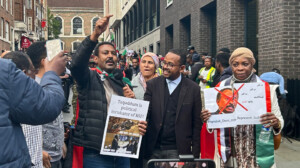Families of Sudan’s December Revolution victims demand justice and protest immunity
On Monday, families of the December Revolution martyrs organised a protest in front of the Republican Palace in Khartoum. They called on the Sovereign Council to lift the juridical immunity for those accused of killing the martyrs. Problems with immunity arose in other trials as well.
 Protestors take to the streets for the March of the Millions, 19 December 2020 (Social Media)
Protestors take to the streets for the March of the Millions, 19 December 2020 (Social Media)
Yesterday, families of the December Revolution martyrs organised a protest in front of the Republican Palace in Khartoum. They called on the Sovereign Council to lift the juridical immunity for those accused of killing the martyrs. Problems with immunity arose in other trials as well.
The families handed a memorandum to Sovereign Council member Mohamed El Faki, which stated that immunity is the biggest obstacle to justice and that most of the perpetrators of the violence currently enjoy immunity. The memorandum also explained that security forces and other regular forces have not responded to any requests by the Public Prosecutor to lift immunities.
The families said that the Public Prosecutor informed them during a previous session that failure to lift the immunities of the regular forces’ employees impedes the progress of the martyrs’ cases as they take away the impact of convictions. He also called on the families of the martyrs to form a mechanism with the military and security forces and the Central Investigation Department to implement an arrest warrant for the regular forces' employees accused of killing the martyrs.
Mohamed El Faki acknowledged the slow progress of the martyrs’ cases. He explained that the cases are linked to the process of reforming the judicial system and security services. He promised to lift the immunity of all those involved or accused and said that the stability of the transitional period relied on achieving justice in the cases of the martyrs.
On December 19, thousands of Sudanese took the streets to celebrate the second anniversary of the 2018 December Revolution. The protesters did not only celebrate, they also demanded the correction of the course of the revolution.
Ahmed Bataran, a leading member of the Resistance Committees, called the commemorative marches “a renewal of the demonstrations that brought down the former regime.” He said that “nothing has been achieved so far. We have to call for freedom, peace, and justice again to renew the revolution and improve people's livelihoods”.
Achieving justice for those who lost their lives during the revolution will be seen as an important step towards justice and peace for Sudan.
Similar problems occurred during the trials of people killed during the revolution. The father of Abdelsalam Kasha, a protestor killed during the uprising, denounced the “impunity enjoyed by the government forces,” explaining that “it hinders retribution”.
The trial session were heavily delayed as well. Last week, the Public Prosecutor informed activists that the reason for the delay is the non-cooperation of the authorities in lifting the impunity of the accused.
Darfur tribal trials
In South Darfur, the steering committee of the Darfur Bar Association (DBA) called for the formation of a special committee to investigate the killing of 15 and wounding of 34 tribesmen in an attack on Gireida town.
A dispute had occurred at the Rahad Abu Dereisa water well between members of the Fallata (pastoralists) and the Masalit (farmers) , which developed into a firefight. Two Fallata tribesmen were shot dead. In response, Fallata militants attacked Masalit neighbourhoods in Gireida, which led to the death of 13 Masalit. 34 others were injured.
In a statement, the subcommittee affirmed that the reconciliation conferences between Darfuri tribes and the payments of diya (blood money) earlier this year constitute one of the causes of immunity for the perpetrators. Additionally, the formality of the conferences led to the fact that root causes of the tribal conflicts between the two tribes were not addressed and those who are responsible for it were not identified.
The subcommittee argued that it is necessary to disarm everyone involved and transfer all weapons to the police and the army. The committee also called for the dismantling of militias, their integration into the Sudanese Armed Forces (SAF), and the restructuring of the security services in accordance with the agreements stipulated in the Constitutional Document.
In May, eight Darfuri tribes, including the Fallata and the Masalit, signed a comprehensive peace agreement but violent conflicts took place in July and October, leaving dozens dead or injured.
Radio Dabanga’s editorial independence means that we can continue to provide factual updates about political developments to Sudanese and international actors, educate people about how to avoid outbreaks of infectious diseases, and provide a window to the world for those in all corners of Sudan. Support Radio Dabanga for as little as €2.50, the equivalent of a cup of coffee.












 and then
and then